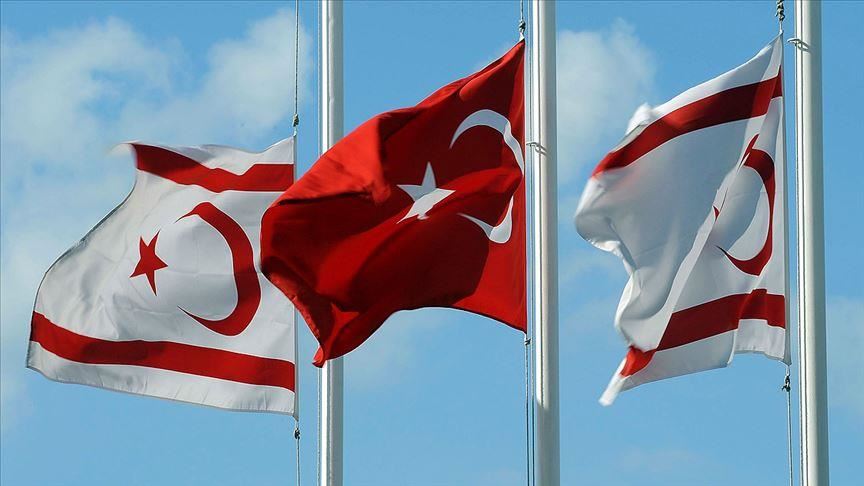
ANKARA
Friday marks the 36th foundation anniversary of the Turkish Republic of Northern Cyprus (TRNC), where the Turkish Cypriots live in peace and harmony, unlike the period when they were oppressed by ultra-nationalist Greek Cypriots.
The sovereignty of the Turkish Cypriots did not come any easy as they had to go through many difficulties and challenges ahead of the country's foundation on Nov. 15, 1983.
The mid-1950s marked rainy days for the Turkish Cypriots as they were subjected to oppression and killings by a terror group called EOKA -- which sought to annex the island to Greece.
The terror group wanted to eradicate Turkish Cypriots' existence on the island and therefore resorted to brutal violence that led to the latter's abandonment of at least 33 villages from 1955 to 1958.
Notably, Greece decided to take the Cyprus matter to the UN and filed various applications between 1954 and 1958 calling on the international organization to recognize Greek Cypriots' self-determination.
In response, the U.K., -- then-ruler of the island -- said the Turkish Cypriots should have "self-determination" rights as well and partition stood as a valid option to end the dispute.
With the approval of the U.K., Turkey and Greece reached a consensus on Feb. 11, 1959, leading to the Zurich and London agreements that later paved the way for the establishment of the Republic of Cyprus in 1960 where all three countries would be guarantors.
The Turkish Cypriots, weary of the brutal violence of EOKA, finally had a glimmer of hope; however, they would soon realize that the promises made were nothing but a mirage.
‘Bloody Christmas’
While the Turkish Cypriots were discriminated and alienated by the Greek Cypriots in state institutions, systematic and comprehensive attacks began on Dec. 21, 1963 when a bloody incident, which was later termed as "Bloody Christmas", took place.
A total of 103 Turkish Cypriot villages were attacked, leading to hundreds of deaths. In fact, the bloody campaign led to the displacement of 30,000 Turkish Cypriots, who had to take shelter in an area constituting merely 3% of the island.
The "Bloody Christmas" incidents gave birth to the partition of the central city of Lefkosa on Dec. 27, 1963; The line of partition is today called "Green Line".
In 1967, a military junta ousted the government in Greece and started to destabilize the island. The junta struck two villages in Cyprus -- Bogazici and Gecitkale.
The Greek troops, reaching up to 20,000, were forced to leave the island as Turkey gave a warning and said it would step in as a guarantor force if the aggression continued.
In 1968, Turkish and Greek Cypriots started negotiations under UN mediation, with Turkish side complying with suggestions of the UN, whereas the Greek side remained adamant at rejecting to share a common future with Turks.
On July 15, 1974, the then Cypriot President Cyprus Makarios was ousted by ultra-nationalist and anti-Turkish Nikos Sampson -- one of the leaders of EOKA-B -- a Greek Cypriots paramilitary body formed in the early 1970s.
Shortly after hearing about the coup, Turkey called on the U.K. to hold a joint operation to stop imminent persecution; however, London refused the offer and Ankara decided to step into action on its own on July 20, 1974.
Turkey's National Security Council was quickly established and Bulent Ecevit, then-Prime Minister of Turkey, instructed the army to take action and Cyprus Peace Operation was launched.
With fighter jets flying low over the land and paratroops deployed on the island, Turkey prevented the annexation of Cyprus and brought protection to weary Turkish Cypriots. Ankara halted its operation following the UN Security Council (UNSC) call and agreed on a cease-fire with Greece.
The peace operation proved Turkey's claims about the persecution of Turks as a number of mass graves were unveiled in some Turkish Cypriots towns on the island.
The success of the operation paved the way for the establishment of the Turkish Federated State of Cyprus on Feb. 13, 1975, with Rauf Denktas as president.
On Nov. 15, 1983, the Turkish Federated State of Cyprus held an extraordinary session and the members of the parliament unanimously approved the establishment of the TRNC.
Reunification referendum of 2004
The Greek rejection of the Annan Plan -- named after former UN Secretary-General Kofi Annan -- which envisaged the reunification of the people on the island through a federation in 2004, was yet another milestone in the dispute.
The resolution plan was rejected by the Greek Cypriot administration in dual referendums held in on both sides of the island. While Turkish Cypriots raised support to the plan with 64.91%, the Greek residents of Cyprus rejected it with 75.83%.
According to the latest reports, current UN Secretary-General Antonio Guterres said "new ideas" may be needed for a settlement on the island.
Although the unification plans were dismissed by the Greek Cypriots, the European Union (EU) admitted the Greek side with full membership on the day following the ballot and ignored the existence of Turkish Cypriots.
The conflicting parties launched numerous negotiations between 2005 and 2016; however, the Greek Cypriot government's unilateral declaration of exclusive economic zones in the Eastern Mediterranean and initiation of drilling activities in search of hydrocarbons in the region terminated the talks.
For over half a century, the Greek Cypriots have had an uncompromising attitude in the negotiations and therefore set an obstacle that prevents resolving the protracted dispute on the island.
The decades since have seen several attempts to resolve the Cyprus dispute, all ending in failure. The latest one, held with the participation of the guarantor countries -- Turkey, Greece, and the U.K. -- ended in 2017 in Switzerland.
Today, TRNC stands as a sovereign country closely working with Turkey on hydrocarbon search activities in the Eastern Mediterranean, in addition to close bilateral ties.
Anadolu Agency website contains only a portion of the news stories offered to subscribers in the AA News Broadcasting System (HAS), and in summarized form. Please contact us for subscription options.







